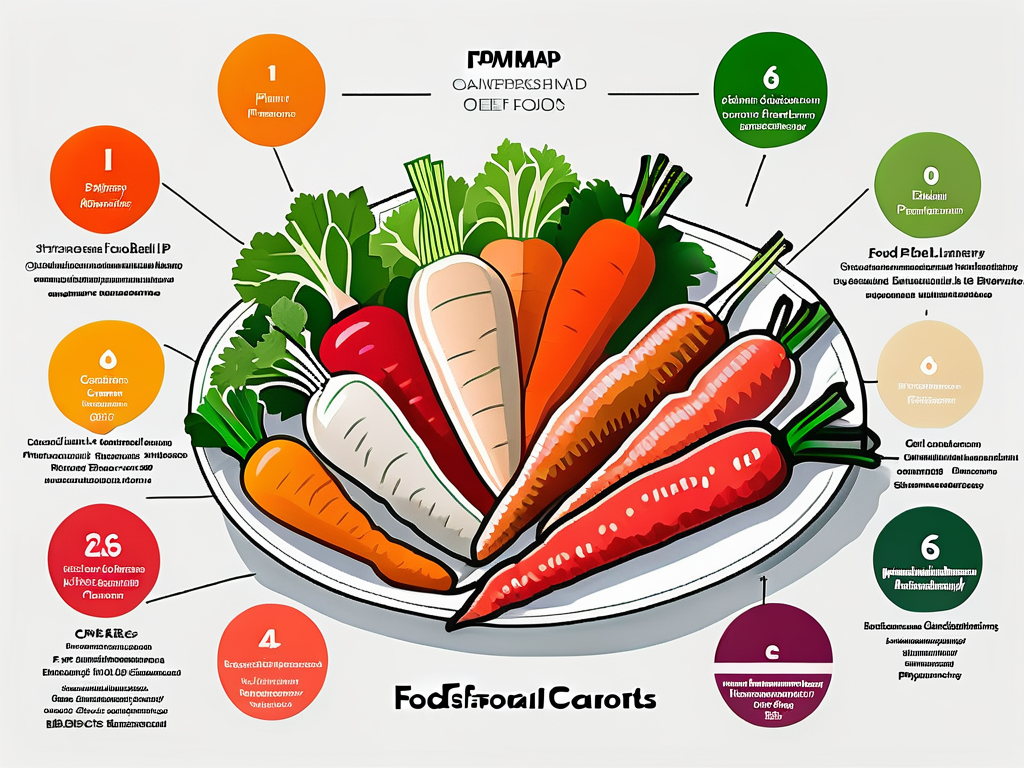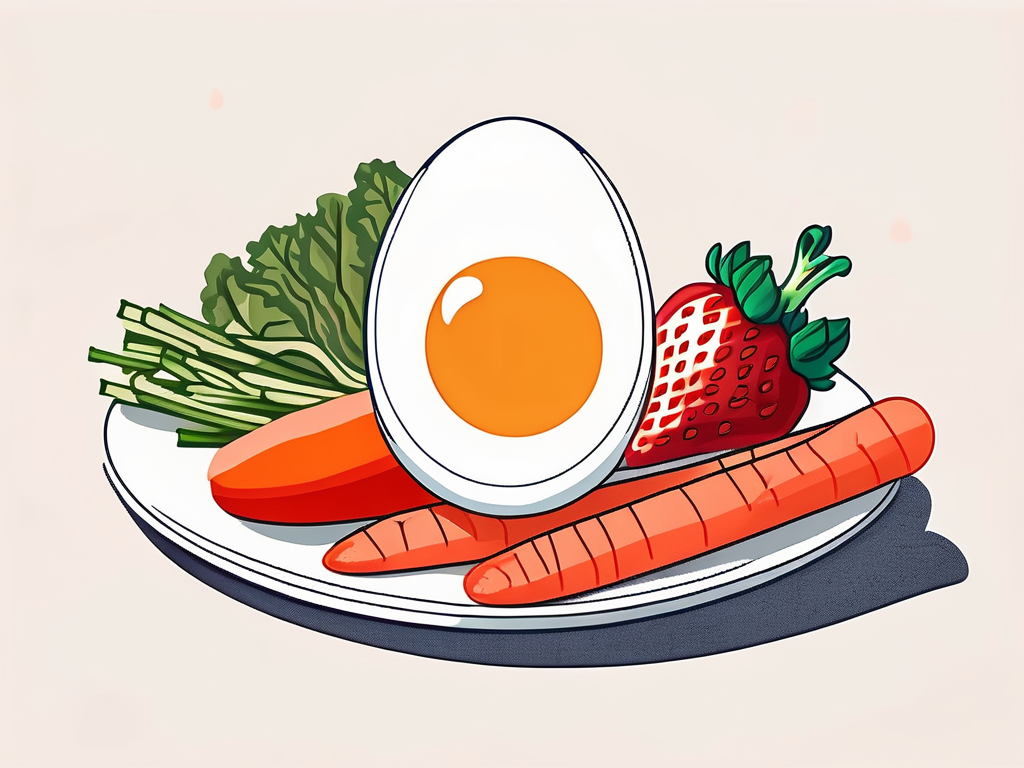In recent years, the low FODMAP diet has gained popularity for its potential to help manage digestive issues such as irritable bowel syndrome (IBS). And as eggs are a common and versatile food, many wonder if hard boiled eggs can be included in this diet. In this article, we will delve into the world of FODMAPs, explore the basics of a low FODMAP diet, examine the nutritional profile of hard boiled eggs, discuss their FODMAP content, and provide alternatives for those seeking low FODMAP protein sources.
Understanding FODMAPs
What are FODMAPs?
FODMAPs are a group of fermentable carbohydrates that can trigger digestive symptoms in certain individuals. FODMAP stands for Fermentable Oligosaccharides, Disaccharides, Monosaccharides, and Polyols. These include various types of sugars and sugar alcohols found in many foods.

Some common examples of foods high in FODMAPs include onions, garlic, wheat, certain fruits like apples and pears, dairy products, and legumes. These foods can be poorly absorbed in the small intestine and fermented by gut bacteria in the large intestine, leading to symptoms in sensitive individuals.
Why are FODMAPs Important for Digestive Health?
For some people, the gut is sensitive to FODMAPs, causing symptoms like bloating, gas, abdominal pain, and diarrhea. By following a low FODMAP diet, individuals can potentially alleviate these uncomfortable symptoms.
It's important to note that not everyone needs to follow a low FODMAP diet. This diet is typically recommended for individuals with irritable bowel syndrome (IBS) or other gastrointestinal disorders where FODMAPs exacerbate symptoms. Working with a healthcare provider or a registered dietitian is crucial to properly implement and monitor a low FODMAP diet to ensure nutritional adequacy while managing symptoms effectively.
The Low FODMAP Diet
The Basics of a Low FODMAP Diet
A low FODMAP diet involves temporarily restricting high FODMAP foods and gradually reintroducing them to identify specific triggers. It is important to consult with a registered dietitian or healthcare professional before starting this diet to ensure proper guidance and support.
Embarking on a low FODMAP diet can be a transformative journey for individuals struggling with irritable bowel syndrome (IBS) or other gastrointestinal issues. By eliminating certain fermentable carbohydrates that can trigger digestive discomfort, many people experience significant relief in their symptoms and an improved quality of life. The process of reintroducing high FODMAP foods one by one allows for a personalized understanding of how each type of carbohydrate affects the body, empowering individuals to make informed dietary choices.
Foods to Avoid and Include in a Low FODMAP Diet
During the elimination phase of the low FODMAP diet, certain foods should be avoided or limited. These include but are not limited to, onions, garlic, wheat, dairy products, certain fruits, and certain legumes. However, it is essential to note that not all high FODMAP foods need to be permanently excluded. Many individuals may be able to tolerate small portions of these foods in the long term.
Exploring the world of low FODMAP foods opens up a diverse range of delicious and nutritious options. From protein-rich eggs, meat, and poultry to an array of fresh seafood bursting with omega-3 fatty acids, there is no shortage of satisfying choices. Additionally, the low FODMAP diet allows for the consumption of specific fruits, vegetables, grains, and lactose-free dairy products, providing a well-rounded and balanced approach to managing digestive sensitivities.
Nutritional Profile of Hard Boiled Eggs
Macronutrients in Hard Boiled Eggs
Hard boiled eggs are a nutritional powerhouse, providing an excellent source of high-quality protein. They also contain healthy fats, including omega-3 fatty acids, and are nearly carbohydrate-free, making them a suitable option for those following a low FODMAP diet.

Each large hard boiled egg contains approximately 6 grams of protein, 5 grams of total fat, and less than 1 gram of carbohydrates.
Hard boiled eggs are not only a great source of protein, but they also contain all nine essential amino acids that the body cannot produce on its own. These amino acids are crucial for various bodily functions, including muscle repair and growth, immune system support, and hormone production.
Vitamins and Minerals in Hard Boiled Eggs
In addition to protein and fats, hard boiled eggs are rich in essential vitamins and minerals. They are an excellent source of vitamin B12, which is crucial for nerve function and DNA synthesis. Hard boiled eggs also provide vitamin D, vitamin A, vitamin E, vitamin K, and various B vitamins.
Furthermore, eggs are a good source of minerals such as iron, selenium, and zinc, which play essential roles in overall health.
Hard boiled eggs are also a significant source of choline, a nutrient that is important for brain health and development. Choline is a precursor to acetylcholine, a neurotransmitter that is vital for memory, mood, and muscle control. Including hard boiled eggs in your diet can help ensure you meet your daily choline needs.
Hard Boiled Eggs and FODMAPs
Are Hard Boiled Eggs Low in FODMAPs?
Yes, hard boiled eggs are considered low in FODMAPs and are generally well-tolerated by individuals with digestive sensitivities. It is worth noting that while eggs themselves are low in FODMAPs, certain accompaniments commonly paired with eggs, such as onions, garlic, or certain sauces, may contain high FODMAP ingredients. Therefore, it is important to consider the overall meal preparation when incorporating eggs into a low FODMAP diet.

Hard boiled eggs are not only low in FODMAPs but also rich in essential nutrients such as protein, vitamins, and minerals. They are a convenient and versatile food option that can be enjoyed in various ways, making them a popular choice for many individuals following a low FODMAP diet.
How to Incorporate Hard Boiled Eggs into a Low FODMAP Diet
There are numerous delicious ways to enjoy hard boiled eggs on a low FODMAP diet. They can be added to salads, used as a protein boost in meals, or simply enjoyed as a snack. With their versatility and nutrient density, hard boiled eggs are a great addition to any low FODMAP meal plan.
Hard boiled eggs can also be used as a substitute for high FODMAP ingredients in recipes, providing a low FODMAP alternative without compromising on taste or texture. Whether chopped and sprinkled over a quinoa bowl or mashed with a dollop of lactose-free yogurt for a creamy spread, hard boiled eggs can elevate the flavor and nutritional value of various dishes.
Other Low FODMAP Protein Sources
Meat and Poultry Options
For those seeking additional low FODMAP protein sources, meat and poultry are excellent choices. Options such as chicken, turkey, beef, and pork are generally well-tolerated and can be prepared in a variety of ways to suit individual preferences.
When selecting meat and poultry for a low FODMAP diet, it's important to choose cuts that are lean and free from added marinades or seasonings that may contain high FODMAP ingredients. Grilling, baking, or sautéing these proteins with low FODMAP herbs and spices can enhance their flavor without triggering digestive issues.
Seafood and Plant-Based Proteins
Seafood, including fish and shellfish, is another great option for those following a low FODMAP diet. Rich in omega-3 fatty acids and high-quality protein, seafood offers a nutritious alternative to traditional meat sources. Grilled salmon, steamed shrimp, or baked cod are delicious low FODMAP choices that can be enjoyed as part of a balanced diet.
Plant-based proteins such as tofu, tempeh, and certain legumes like chickpeas and lentils offer suitable alternatives for individuals opting for a vegetarian or vegan approach. Tofu stir-fries, tempeh tacos, or lentil soups are flavorful dishes that provide ample protein while being gentle on the digestive system.
In conclusion, hard boiled eggs can be considered a low FODMAP food and can be safely incorporated into a low FODMAP diet. With their impressive nutritional profile and versatility, they provide a valuable source of protein and other essential nutrients. However, it's essential to be mindful of the overall meal preparation and choose accompaniments that are also low in FODMAPs. If you have concerns or specific dietary restrictions, it is best to consult with a healthcare professional or registered dietitian to ensure an individualized approach that suits your needs.